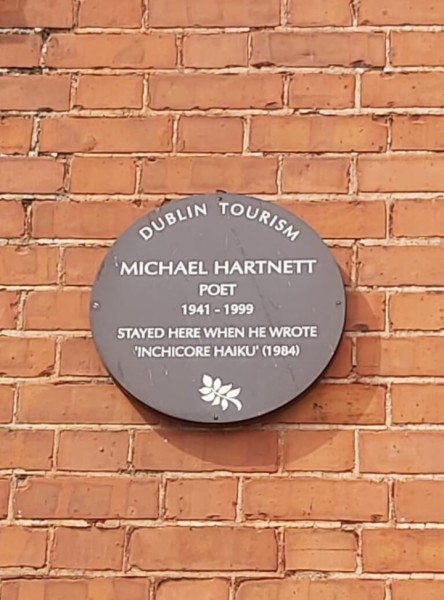


Richmond Barracks is delighted to welcome historian Donal Fallon to write a series of blog posts about the building and its rich history.
Today, Donal considers Michael Harnett’s poem about the locality.
"Now in Inchicore
my cigarette-smoke rises
like lonesome pub-talk"
So begins one of the finest works of modern Irish poetry.
Our forthcoming local history tour, exploring the community of which Richmond Barracks is part, is a combination of many different things. It spans all from twentieth century architecture – and some of the gems of modernism and the Art Deco age that hide in plain sight – to the Irish revolutionary period. More surprising than buildings or radicals is the rich literary dimensions of the story.
One of the greatest poets of twentieth century Ireland was the critically acclaimed Michael Hartnett. He is forever linked to this area having lived on Emmet Road, and for authoring The Inchicore Haiku, the first such published haiku in Ireland and a tribute – warts and all – to the area and its resilient community.
Michael Hartnett was born in Croom, Co. Limerick, in 1941 – a statue in Limerick honours him today, but so too does a plaque on Emmet Road, just a few doors from the Richmond House pub, mentioned in his haiku. In the mid 1980s Hartnett, living in the area, embarked on trying to capture it. Michael O’Flanagan, a constant presence in local history and culture, has noted that “reading the haiku now is like opening a time capsule.”
Praise for Hartnett, from his contemporaries, was deep and sincere. Séamus Heaney insisted that, “he operates from a position of intuition and high learning, at once”, while to Paul Durcan’s mind, “the extraordinary early poems of Michael Hartnett set the gold standard.” Inchicore was lucky the haiku was published at all – in the late 70s, Hartnett vowed to write only in the Irish language going forward, something captured in his work Farewell to English. The break proved short-lived.
In 1985, the haiku captures remaining local institutions:
"In the Richmond House
a good priest pressed in my palm
glad absolution"
There are references to the locality and its people, ‘barrackers’ (as those who lived in Keogh Square were known) and more besides. It also captures some of the problems of the 1980s, returning to the same pub:
"In the Richmond House
the floorboards ooze ancient tears
of unemployment"
Some of it is universal – the sounds of life in any urban – almost suburban – setting:
"The cats at civil war
in the partitioned garden
I stroke my whiskers"
Beyond The Inchicore Haiku, Dermot Bolger’s excellent independent publishing company, Raven Arts Press, did much to promote and publish Hartnett’s work. Collections of his poetry are now much sought after.
His intellectual contribution to Irish life was not limited to his own impressive poetic output, but included important translations of historic Irish poetry. His ability to translate from the native tongue to English – without losing the integrity and meaning of the poems – was an important skill. An internationalist in every sense – and someone who spent time living in Madrid – he also translated poetry by the great Federico García Lorca.
Hartnett died in October 1999. While remembered as “Munster’s de facto poet laureate”, he will always be a special part of Inchicore’s heritage.
The republished Inchicore Haiku, from local publisher Riposte Books, is available to borrow from Dublin City Libraries.
Donal Fallon is a historian, broadcaster and curator from Dublin. Formerly Historian in Residence to Dublin City Council, he is the author of numerous studies of twentieth century Dublin, including The Pillar: The Life and Afterlife of the Nelson Pillar (New Island, 2013). He produces the Three Castles Burning podcast and has contributed to publications including Jacobin, Dublin Historical Review, Saothar and The Irish Times. He is a graduate of Maynooth University, University College Dublin and the Ulster University, and lectures with the Lifelong Learning department of University College Dublin.
Posted 27 May 2020
Tagged with: News